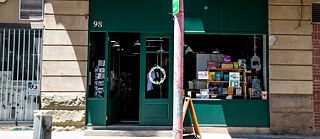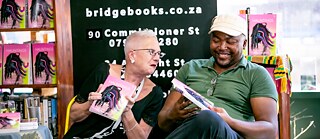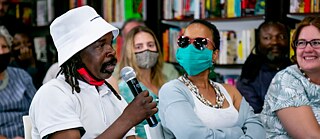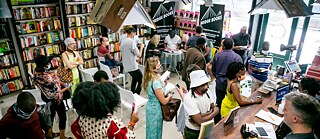Bridge Books, Johannesburg, Southafrica
When the Bookshop Comes to the Readers
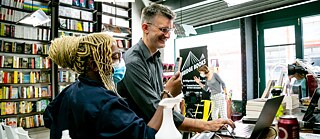
Inspired by the richness and diversity of South African literature, Griffin Shea's bookshop Bridge Books in Johannesburg fills a gap and builds bridges between the independent publishing scene, its authors and readers. The challenge of moving to digital presentation during the Corona pandemic has been met with flying colours, expanding their audience far beyond the city limits.
Byline: Lindokuhle Nkosi
It’s one of the warmer days of Johannesburg’s late Spring. At Bridge Books in Marshalltown, Johannesburg, the few people gathered on chairs, in and around shelves, peering at the lettering on certain book spines mutter about the rain, weeks overdue. But nothing is as it should be. It has been twenty months since President Cyril Ramaphosa announced that the country would be entering into lockdown in response to the worldwide coronavirus pandemic. We know all too grimly what this means now. Could we have grasped then, when the President appeared on our TV screens with his first “my fellow South Africans speech”, what the succeeding few months would entail?
Grief and devastation. Goodbye after virtual goodbye, as fleeting as the Zoom call it appears on. The thin comfort of a voice on the other end of the line when a held hand, a devouring embrace would do. That tears would be never-ending and risky, and that we would witness all around us, the falling apart of things. We would learn very intimately what happens when a centre can not hold, and how we survive here.
In South Africa, the entertainment, education and arts sectors were hit hard. Two years in, arts practitioners are still waiting for their promised support from the government, with a state inquiry being commissioned into an amount of R300 million that has either been “mis-allocated” or “over-committed”. And with no restaurants, no jazz clubs, no galleries and book stores to go to, many institutions are scrambling for a piece of online real estate.
JiaJia Fei opened the world’s first digital art consultancy whose launch coincided with the global lockdown. In an interview, she explained how the quick digital exploratory missions may cause more damage to the institutions.
“The urgency for museums, galleries and arts organisations to go online, especially when propelled by the global closure of cultural spaces, is not unlike the transformation newspapers went through decades ago. If the entire world is now only able to engage online, how do these spaces shift business operations online? More importantly, how can we make sure these organisations stay in business?”
The scenario detailed by Fei above is one that many institutions have found themselves grappling with. One of them being Bridge Books. Griffin Shea, the founder of the bookstore, ended up in Johannesburg by happy accident. A former journalist, Shea did his Masters in Creative Writing at Wits University. “And it really got me wondering,” what happened to all the books?” With this Shea is referring to the absence of local fiction on the shelves of large South African book retailers.
We’re standing in what used to be Cecil John Rhodes private library at the member’s only Rand Club, almost directly above the mezzanine hole-in-the-wall that is Bridge Books. His statue may have fallen at the University of Cape Town but his building still stands, built as a watering hole for early colonialists invested in the Gold Rush.
Bridge Books stands less than 1km away from Park Station, the largest railway station in Africa, and a hub for rail and road public transportation. Before the pandemic, the station saw more than one million users pass through its arched belly a day, by train. That’s not counting the half million on the bus, and the countless more users of public taxis. And right outside the station, lined up on the pavement and under umbrellas, are dealers of predominantly used books.
“I started meeting all these book sellers, and looking at what kind of books they sell. There’s about 200 bookstores around this block. And when I tell people about them, they’re like “where?” For example, one of the bookstores next stores also sells coats, hair extensions, herbal supplements. There’s a Christian bookstore that only sells [literature] in vernacular. Another that only imports books from Nigerian mega churches. So when you walk around you realise that there’s all this reading happening in the city that's completely disconnected from what we think of as mainstream publishing.”
But even this robust reading culture has suffered. During the first three months of the “hard lockdown”, people were barely allowed outside of their homes. Books were deemed non-essential goods. It was illegal to trade them.
Thabiso Mthimkhulu is a store manager with Bridge Books. He explains that even after the hard lockdowns, few people returned to the retailer. “They’d rather go online. And online... we really needed to have a better presence.”
“What happened is that we would create events, and with those events we knew we’d be able to attract people from outside of the city to attend the events.” This also increased the base of the buying market outside the bounds of the city. The Goethe Relief Funding allowed Bridge Books to support its digital reach with cameras and streaming equipment. Additionally, employees at the store were able to receive training in the equipment, upping their skills and the quality of its virtual output.
“We’d always tried to stream our events before,” laughs Shea. “But it was very bad. We’d kind of prop a phone up against a book and stream on Facebook live. And the sound would burn your ears, it was so bad.”
As much as in person experience helps grow literature into the lived space, when well produced, the digisphere can offer us some kind of human connection. A suitable way to touch in an environment that has made contact and embrace, dangerous. Bridge Books was able to stream the launch of Zakes Mda’s novel, “The Wayfarer’s Hymns'' to screens as far as Canada and the United States of America.
“Without being melodramatic, when we were approved for the grant, I cried a little bit because I was feeling very stressed.” laughs Shea. “This winter was so hard for us. We were locked down for three months this time. When we were approved, I was like “oh my god, finally now there’s a path. I can figure out a plan to make this work, not just for the three months of the grants cycle, but now we have a system to build on going forward if we’re locked down again. We can still work. We can engage with our customers. We can host events. And its’ super important, not just for the book events, but also [for the reputation of the city]. The city is connecting to itself in a really different way.
(Lindokuhle Nkosi is a South African writer whose writing explores art and marginalised communities)
Under the title "Digital überleben in Zeiten des Lockdown. Wenn die Leserinnen und Leser fernbleiben: Wie sich Bridge Books, ein Buchladen in Johannesburg, durch die Pandemie kämpft" the article appeared on February 5th 2022 in the German newspaper Der Tagesspiegel
